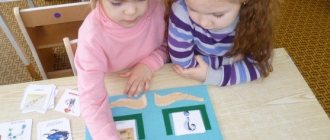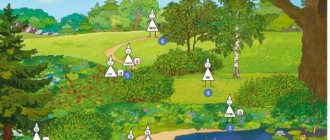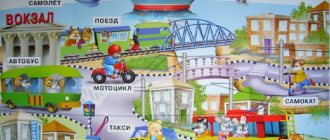Speech development tasks for children 4-5 years old
Below are several options for such tasks.
“Which word is extra and why?”
The goal of the game is to develop auditory attention, auditory memory, and logical thinking. The game will also help automate your speaking skill. In some cases it is used to treat stuttering. In this case, a hand is added for smoother speech.
The speech therapist says four words. The child repeats them and says which word is extra. He then explains why he chose that particular word.
For example: chair, table, sofa, tree. The extra word is tree, because everything else is called furniture, and tree is a plant.
Speech development tasks for children 4-5 years old
“Say it differently (learn synonyms)”
This is a ball game. It develops memory, speed of thinking, and logic. The teacher calls the word and throws the ball to the child. The kid must catch and come up with a synonym word. The words could be:
- Skyscraper),
- Protect (nature)
- Drive,
- Famous (person).
The words themselves are best pronounced in phrases. This way the child will be able to better understand the meaning of the word.
There is a second option. In it you need to name the antonym of the word you hear.
In general, this game can be modified in different ways. For example, the teacher may not say anything to this child. The child can see or hear some object, make a guess about it and name its synonym or antonym - it depends on the specific task.
"I'll start talking, and you finish"
This game can also have many variations: add letters or syllables to make words, or you can invent words to make a sentence. The main skill that this game develops is to think logically. For example:
- “In summer the grass is green, and in autumn……(yellow).”
- “The road is wide, but the path…..(narrow).”
The teacher asks questions and the children answer them
To develop speech, you need to communicate. But in conditions where parents are constantly working, this is often difficult to do. A kindergarten (preschool) helps with this. Teachers interact with children and teach them how to communicate with others. But how to provoke them to talk? Communication workshops can help. This can also be done using questions.
Educator
But here there are several rules:
- The easiest way to communicate is on the topic of what is happening around. For example, if your baby is playing with toys, you can ask him what color, size, shape, etc. they are.
- Questions should be clear, specific and concise. The child's psyche simply does not perceive questions that are too long. Attention instantly switches to something more interesting and understandable.
- It is better to stick to one topic when asking questions. For example, if a teacher asks about one toy and then moves on to a question about parents, the child may simply misunderstand him. If we have already started talking about toys, the topic needs to be continued.
Children's speech is not yet clear enough. Its development is certainly very important. And you shouldn’t neglect them, even if it seems that everything is fine with the child. The better a preschooler’s ability to communicate is developed, the better the processes of adaptation and socialization at school will be. This task falls on the shoulders of educators.
Automation of sound
How to conduct classes at home correctly
It is not necessary to immediately run to a speech therapist. To begin with, you can try exercises for speech therapy classes for children 4-5 years old at home. They will help the child master correct speech, learn to hear and pronounce missing sounds.
Children should definitely be taught at home so that they learn how to pronounce sounds correctly.
Typically, speech therapists advise following these simple rules:
- Exercises should be performed every day, always in a child-friendly environment.
- Be sure to conduct lessons in a playful way. It is important to captivate the child so that the tasks do not seem boring and uninteresting to him. You can even arrange a sort of competition to see who can complete the tasks better or faster.
- You cannot criticize or make sarcastic remarks to your child. So the desire to learn something new will disappear completely. Be sure to praise your child when he completes a task. Even if something doesn’t work out, you need to praise him for trying.
- For classes, be sure to use literature that is designed to help parents teach their children independently. There are special reference books on speech therapy, which contain many different exercises for children, as well as recommendations for parents.
- A speech therapy exercise for children 4-5 years old can be turned into pleasure if you correct your speech by studying rhymes and tongue twisters. They will not only allow the child to quickly grasp the necessary sounds, but will also have a positive effect on the development of memory.
- You need to show your child an example of correct speech. Pronounce all words clearly so that the baby understands and clearly hears what is being said to him. You need to talk to him as much as possible, have conversations on any topic, tell different stories.
Learning to speak: vocabulary development in preschool age
High-quality warm-up for lips and tongue
Warming up the lips and tongue plays an important role in the formation of correct speech.
Note! The baby will begin to pronounce words more clearly, without swallowing the ending.
Exercises as a warm-up:
- Stretch your lips in a smile without showing your teeth. You should try to smile as widely as possible.
- Pull your lips forward as if they were an elephant’s proboscis.
- Take turns inflating one or the other cheek, then retract them in the same order.
- Open your mouth and pull your lower jaw as low as possible, while holding your tongue to the roof of your mouth.
- Open your mouth, stick out your tongue. Then put it in your mouth. Do this exercise for 15 seconds.
- Pull out your tongue and blow on a piece of cotton wool on the table until it falls off the table. Blowing with lips is prohibited.
- Use the tip of your tongue to first move along the upper teeth from the inside, then along the lower ones.
- “Scratch” your tongue with your teeth, resting on the lower gum.
Important! To achieve visible results, you need to perform these exercises regularly. Each of them must be repeated at least 5-6 times.
Games for speech development for children 4-5 years old
Many people wonder how to develop speech in children. The easiest way to do this is with special games. After all, this is the only way children perceive the world around them.
We start from the norms of speech development of children 4-5 years old
To accurately determine problems with speech development in a child, you need to know what he should already be doing at four or five years old. Only if there is a discrepancy with the standards, you should contact doctors such as speech therapists and speech pathologists. Otherwise, first grade may be too difficult for the child.
Important! Many schools conduct “interviews” with children. If the child's speech is unclear, inconsistent or meaningless, parents may be asked to keep the child in kindergarten for another year.
At this age, children need to learn a few things:
- Talk in such a way that not only your family, but also everyone around you understands him.
- It is enough to freely use your vocabulary and compose logical sentences from more than 6 phrases.
- Understand and describe the difference between animate and inanimate.
- Describe objects and find them in accordance with the description.
- Understand what prepositions are needed for and be able to use them correctly.
Games with children
- Know the different professions and understand what they do.
- Know how to carry on a conversation and ask relevant questions about the topic.
- Retell fairy tales, short stories and various stories. Highlight the main meaning in them.
- Say your first name, last name, age and residential address.
- Know short poems or ditties by heart.
- Be able to answer simple questions about your life (where you’ve been, who you’ve seen, what you’ve eaten, etc.)
Those children who have not mastered these skills are diagnosed with SRD - delayed speech development.
To make this diagnosis, several tests are carried out, including the following aspects:
- The sound-syllable composition of the word.
- Sensitivity to sounds.
- The state of vocabulary and grammatical structure of different types of emotional speech.
Based on this test, recommendations for speech development are made. If ZRR is not worth it, but the child cannot do any of the above, various didactic games to form the grammatical structure of speech can help him.
Examples from the card index of didactic games:
- "Find the mistake." The child is shown a picture of a tiger. The elder says that the tiger is running, the tiger is eating, the tiger is lying, the tiger is drinking, etc. The child must name the correct action. Thanks to this game, children learn to pronounce words correctly and develop auditory attention.
Tiger
- "Maybe or not." The child is shown a picture of a tree in which everything is depicted incorrectly. A parent asks if a spider can hang on a tree or if a tree can be green in the fall. The kid must give the correct answer. This game helps develop children's logic.
- "Seasons". The mother describes some season of the year to the child, and he must name it correctly. This game develops memory, logic, auditory attention and pronunciation.
- "Which? Which? Which?" The child is shown any object in the room. You need to describe its shape, color, location. The game can be made more difficult. The child looks at something for 15 seconds, then turns away and describes it by heart. This game develops memory and visual perception.
Tree
- Description of the item. The child is offered a certain characteristic. It is necessary to describe what objects can correspond to it. This activity helps to develop the ability to classify objects according to certain criteria.
- When? It is called a typical action for a certain time of year. For example, skiing. The kid must say what time of year they do this. You can also turn the game around and ask what they do in winter. The game develops memory and the ability to classify actions.
Forming a sound culture of speech to prepare for literacy training
Most didactic games are used by teachers in kindergartens. According to the modern Federal State Educational Standard, they are the ones who should develop the speech of preschoolers.
Important! However, you should not rely only on them. It is impossible to develop something if you do not do it constantly. But a teacher cannot always be with one child. Therefore, parents should also conduct similar games at home.
Games for the formation of grammatical structure of speech in the senior group
The peculiarity of games for the formation of the grammatical structure of speech in the senior and middle groups is that they are not aimed at increasing the child’s vocabulary, but at the ability to construct grammatically correct sentences. There are a lot of such games, here are a few of them:
- “Pick up a sign.” The goal is to be able to coordinate nouns and adjectives. The teacher names the word and asks questions: “which one? which? which? which?". The child answers. For example: what kind of tree? Green, tall. What blouse? White, beautiful, new.
- "A sweet name." The goal can be called the ability to compose words using diminutive suffixes. For example, Masha is Mashenka, mom is mommy, a white hare is a little white bunny, a gray wolf is a little gray wolf cub. You should start with simple words, and only then move on to phrases.
Games for the development of speech breathing in the 2nd junior group
Many people believe that developing speech breathing is useless. But that's not true. It is this that allows you to speak smoothly, and not be interrupted after each syllable. But not everyone is born with a developed skill. Therefore, kindergarten teachers try to develop it in their students. There are special games for this. Here are some of them:
- "Swing". This exercise develops a smooth, calm, long breathing exhalation. It also strengthens physiological breathing in children. For a lying child, a plush toy is placed on his stomach in the area of the diaphragm. The child inhales and exhales through the nose, as usual. The teacher recites the verse: Swing up (inhale), Swing down (exhale), Hold on tighter, my friend.
- "Angry hedgehog." You need to stand up and imagine how the hedgehog curls up into a ball in danger. Then you need to bend over and in this state say “Fff” loudly.
Thus, the development of a child’s speech is very important for his future life. To do this, you need to work with your child using special games. Otherwise, the child may develop mental retardation disorder, which may negatively affect his communication with others.
Don't miss anything
Noting the child’s mistakes, parents can choose other games, for example, those that help master the singular and plural forms of verbs, the imperative mood, present and past tense, practice the use of adverbs, prepositions, the ability to coordinate nouns with adjectives, verbs, etc.
If a child has problems pronouncing sounds, tongue twisters, articulation exercises (discussed here), and the development of fine motor skills (described in this article) will help. If a child cannot differentiate sounds or syllables in speech, games to develop phonemic awareness will help (see here - “Speech development in preschool children”).
The main thing is to remember: we develop a child’s speech not in order to show off to neighbors or “outdo” someone, but to help the child in further socialization, in learning, and in communicating with peers. Therefore, you should not chase after someone or prove something to someone. The task of parents is to help their child become successful in life, and not to break someone else's records.
Exercises for general speech development at home
At home, it is imperative to regularly conduct speech therapy classes for children 4-5 years old, the exercises of which include not only the speech part, but also gymnastics for the speech organs and fingers.
Finger gymnastics
This set of simple exercises stimulates the part in the brain center that is responsible for correct speech. This is why fine motor skills classes are needed not only for the little ones, but also for preschoolers.
Finger exercises stimulate the part of the brain responsible for correct speech
All exercises are done 8-10 repetitions:
- “Opening” and “closing” the fingers on each hand. First one by one, then together. You can gradually increase the speed.
- Place your hands on the table: the left one touches the table with the palm, the right one with the back. Then at the same time you need to turn your hands over.
- First, draw a river: fold your hands, palms up, as if you have water in them. Then depict a steamboat - put your palms together, press your thumbs together and lift them up. Then depict the fish that have arrived: press all your fingers together, palms together and make movements with your hands, as if a fish is swimming.
- Draw a tree with branches - arms vertically, fingers spread out in different directions. Then show the roots of the tree - in the same position, move your hands with your fingers down. Then show leaf fall: quickly, quickly clench and unclench your fingers.
Articulation gymnastics
These exercises are aimed at developing the tongue, the main organ responsible for the correct pronunciation of sounds.
Automation of sound C
Note! Thanks to regular training in articulation gymnastics, the child will soon begin to pronounce even the most difficult sounds.
- Smile as wide as possible, teeth are closed, exactly on top of each other. Stay in this position and count 10 seconds.
- Pull your lips forward and pretend as if an elephant is drawing water with its trunk. Stay for 10 seconds in this position.
- Pretend to be a snake: smile broadly, stick out your tongue like a tube, then hide it back.
- Open your mouth wide and make a clicking sound with your tongue, imitating a horse. At the same time, it is important to ensure that the child’s lower jaw is motionless and only the tongue is working.
- Smile widely, stick out your tongue as far as possible and lightly squeeze it between your teeth. In this position, “pull” the tongue back into the mouth.
- Open your mouth wide, stick out your tongue and pretend to be a clock - move your tongue from one corner of your mouth to the other.
Repeat all these exercises 8-10 times or for 10-15 seconds.
Games for developing phonemic sound
Speech therapy games for 4-5 year old children to develop phonemic sound must be included in daily classes. They are simple and at the same time interesting, and the results will not take long to arrive. After just a month of regular exercises, the quality of children's speech will noticeably improve.
- "Game of Silence" This game is very simple. The child is asked not to make a sound for 2 minutes and close his eyes. As soon as the time is up, then ask the baby to tell what sounds he heard.
- "Clap-stomp." The essence of the game: agree in advance with the child which sound he will stomp on and which sound he will clap on. For example, if he hears the sound [w], then he stomps his foot, if the sound [r], then he claps his palms. Next, the adult names different sounds, and when the child hears the ones he needs, he claps or stomps.
- "Catch the word." The essence of this game is simple: the child is given a word, upon hearing which he will have to clap his hands. Next, the adult names several words in turn that sound similar. As soon as the child hears what he needs, he should clap his hands.
To develop phonemic sound, it is necessary to regularly play speech therapy games







